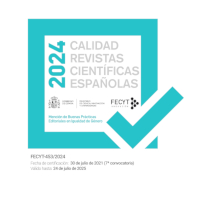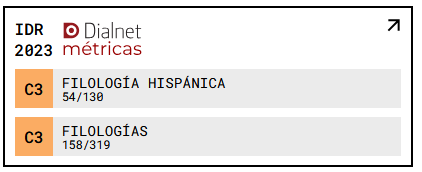La parodie du style éditorial et journalistique dans "Warreniana"
une autre (re)vision du romantism
DOI :
https://doi.org/10.18172/cif.5695Mots-clés :
Warreniana, Blackwood’s Edinburgh Magazine, New Monthly Magazine, The Times, John Bull, parodie de journalRésumé
Warreniana (1824) par W. F. Deacon présente une collection de parodies littéraires qui varient entre celles qui se concentrent sur des poètes spécifiques et leurs œuvres ("parodie de poète") et celles qui parodient des styles spécifiques de la presse romantique ("parodie de journal"). Ce sont ces dernières qui font l'objet de la présente étude, les premières, ainsi que la structure et la nature de Warreniana, ayant déjà été analysées dans une étude publiée antérieurement. Deacon accorde plus d'importance à la parodie des auteurs romantiques qu'au style journalistique ou éditorial de Warreniana, mais il les imite également. Il inclut ainsi quatre parties consacrées au Blackwood's Edinburgh Magazine, au New Monthly Magazine, au Times et à John Bull. Ce sont ces parodies ainsi que la parodie de style éditorial de Gifford qui sont analysées, complétant ainsi l'étude de l'artillerie parodique de Deacon pour offrir une autre image du romantisme parallèle de la littérature plus canonique du mouvement. Afin de mieux comprendre cette parodie dans Warreniana, et sa pertinence dans le Romantisme, nous partirons de la relation entre la parodie et la presse et de l'analyse de termes significatifs tels que "puff", encadrés dans le contexte journalistique des stratégies de marketing, qui est également très présent dans Warreniana.
Téléchargements
Références
COMELLAS, M. (2005) “‘¡Yo quiero ser caribe! ¡Yo quiero ser romántico!’ del buen humor del anti-romanticism.” Del Romanticismo al Realismo: Actas del I Coloquio de la Sociedad de Literatura Española del Siglo XIX. Barcelona, Universitat (1998, pp. 357-37) y Alicante, Biblioteca virtual Miguel de Cervantes. https://www.cervantesvirtual.com/nd/ark:/59851/bmc154w0
COX, J. (1998) Poetry and Politics in the Cockney School: Keats, Shelley, Hunt and their Circle. Cambridge, CUP.
FELTON, F. (1972). Thomas Love Peacock. London, George Allen and Unwin.
FULFORD, R. (1967). The Trial of Queen Caroline. London: B. T. Batsford.
HULL, S. ed. (2008). The British Periodical Text, 1797-1835: A Collection of Essays. Penrith, Humanities-Ebooks.
KLANCHER, J. P. (1987). The Making of the English Reading Audiences, 1790-1832. Madison, U of Wisconsin P.
KLANCHER, J. P. (2013). Transfiguring the Arts and Sciences: Knowledge and Cultural Institutions in the Romantic Age. Cambridge, CUP. DOI: https://doi.org/10.1017/CBO9781139245937
LAQUEUR, T. (1982). “The Queen Caroline Affair: Politics as Art in the Reign of George IV”. Journal of Modern History 54, pp. 417-466. DOI: https://doi.org/10.1086/244178
MASON, N. (2013) Literary Advertising and the Shaping of British Romanticism. Baltimore, Johns Hopkins UP. DOI: https://doi.org/10.1353/book.25268
PARKER, M. (2000). Literary Magazines and British Romanticism. Cambridge, CUP. DOI: https://doi.org/10.1017/CBO9780511484414
RAMOS, M. R. (2021). “Otro romanticismo inglés: la ventriloquia de Thomas Love Peacock y el eclecticismo crítico y temático de su obra paródica”. Tonos Digital (Peri Biblión) 41.2. http://hdl.handle.net/10201/111147
RAMOS, M. R. (2022a). “P. G. Patmore’s view of Romanticism through the parody of literary reviews in Rejected Articles (1826)”. Erebea. Revista De Humanidades Y Ciencias Sociales, 12.2. https://doi.org/10.33776/erebea.v12i2.7782
RAMOS, M. R. (2023). “The Anti-Jacobin and its Parodic Strategies: Parodying Jacobin Ideas and Authors” RAEI. Revista Alicantina de Estudios Ingleses 38, pp. 131-150. https://doi.org/10.14198/raei.2023.38.08 DOI: https://doi.org/10.14198/raei.2023.38.08
RAMOS, M. R. (2022b). “W. F. Deacon and his revision of Romanticism in Warreniana through Literary Parody and Advertising Campaigns to Promote Blacking”. Miscelánea: A Journal of English and American Studies 65, pp.105-125. https://doi.org/10.26754/ojs_misc/mj.20226849 DOI: https://doi.org/10.26754/ojs_misc/mj.20226849
ROE, N. (1997). John Keats and the Culture of Dissent. Oxford, Clarendon Press. DOI: https://doi.org/10.1093/acprof:oso/9780198186298.001.0001
SHOENFIELD, M. (1990). “Voices Together: Lamb, Hazlitt and the London”, Studies in Romanticism, 29, pp. 257-72. https://doi.org/10.2307/25600838 DOI: https://doi.org/10.2307/25600838
SMITH, E. A. (1994). A Queen on Trial. The Affair of Queen Caroline. Alan Sutton.
STRACHAN, John. ed. (1999) Warreniana. Vol. 4 en Graeme Stones and John Strachan eds. Parodies of the Romantic Age. 5 vols. London: Pickering and Chatto.
TAYLOR, D. F. (2018). The Politics of Parody: A Literary History of Caricature, 1760-1830. Yale: YUP. DOI: https://doi.org/10.12987/yale/9780300223750.001.0001
THOMPSON, E. P. The Making of the English Working Class. London: Penguin Books, 1980.
WEATLEY, K. (2013). Romantic Feuds. Transcending the “Age of Personality”. Farnham and Burlington: Ashgate.
WU, D. (2008). William Hazlitt. The First Modern Man. Oxford: OUP.
Téléchargements
Publié-e
Comment citer
Numéro
Rubrique
Licence
© María Rocío Ramos Ramos 2023

Cette œuvre est sous licence Creative Commons Attribution 4.0 International.
Les articles appartiennent à leurs auteurs respectifs qui accordent à la revue le droit de première publication, l’autorisation de la revue n’étant pas nécessaire pour leur diffusion une fois publiés. Une fois la version de l’éditeur publiée, l’auteur est tenu de s’y référer dans les versions archivées dans les dépôts personnels ou institutionnels.
Il est conseillé aux auteurs/s d’archiver la version de l’éditeur dans des dépôts institutionnels.
La revue permettant à d'autres de réutiliser les ouvrages selon les conditions de la licence CC Attribution 4.0 International (CC BY 4.0)














